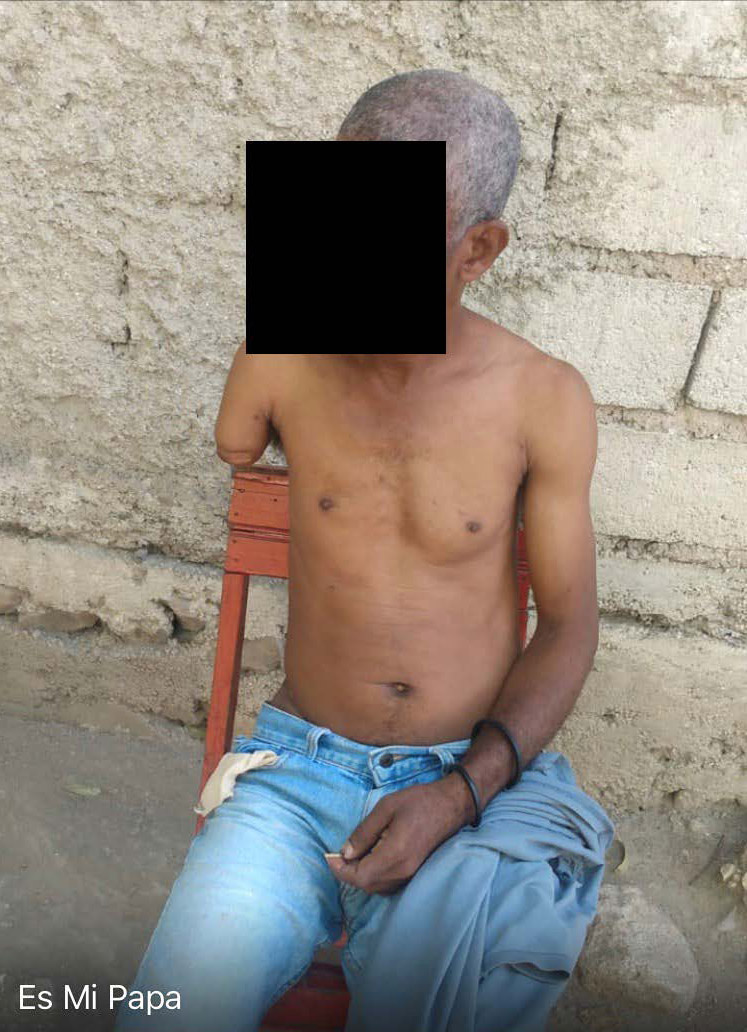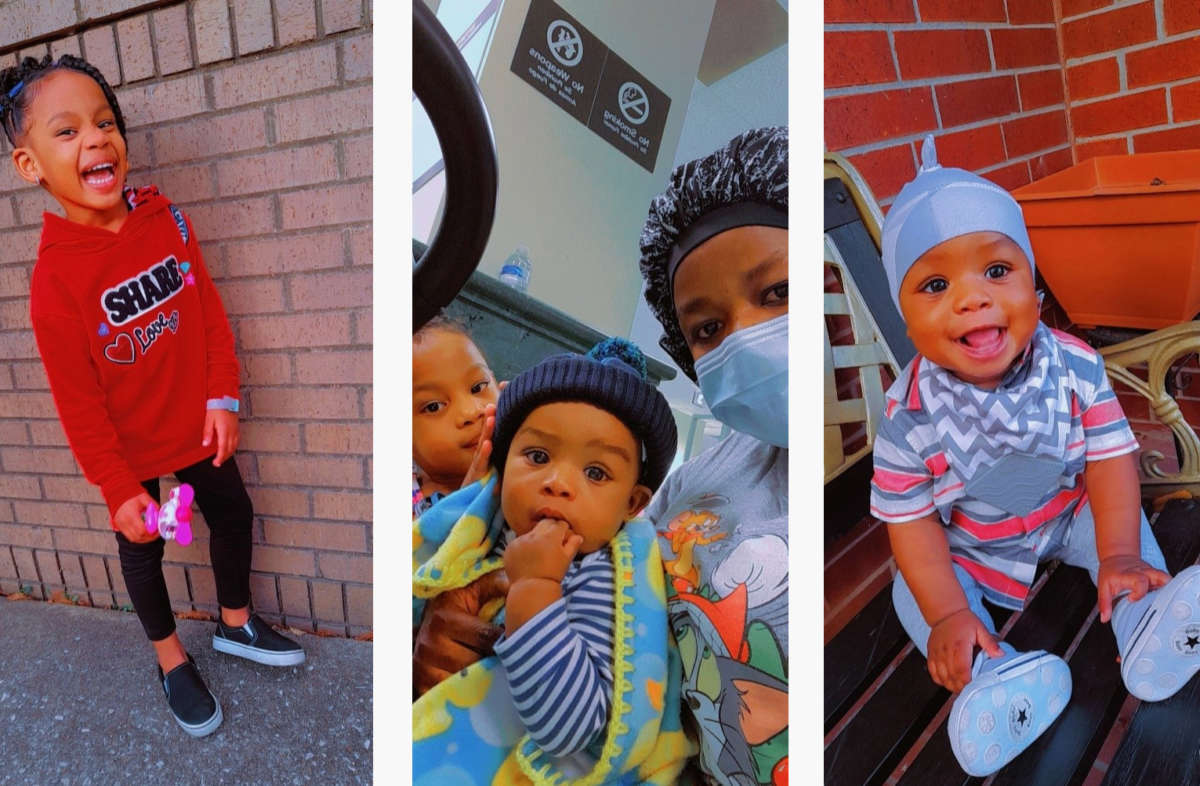Whatever else the story of Haitian asylum seekers Daniel and Rodeline is — an epic quest or near Job-ian test of faith — it’s also a love story.
They met at Daniel’s cousin’s place in Rio de Janeiro seven years ago. Separately, at their parents’ urging, they’d both fled for their lives from Haiti to Brazil. Rodeline says Brazil is “a beautiful country, but there’s no work.” Unable to support herself, she was trapped in escalating domestic violence. Daniel would sometimes visit his cousin, a close friend of Rodeline’s, and he’d hear them talking about her increasingly dangerous living situation. He helped her get away from all that, and helped her heal.
In the spring of 2021, Daniel, Rodeline (pregnant with their son) and their 5-year-old daughter Jeanine left Brazil and made their way by foot, bus and taxi to Central America. Stalled in Honduras while Daniel worked to raise additional funds for their safe crossing to the U.S., Rodeline says she experienced anti-Black racism so extreme that she worried about whether her baby could be delivered safely there. The couple made a painful decision: Daniel would stay behind to continue working and Rodeline and Jeanine would go on without him. Mother and daughter crossed in a caravan in June, and he followed in September.
This Valentine’s Day, the first since they married and started a family, they were separated. Daniel is a fugitive, hiding and on the run after being wrongly deported by U.S. Immigration and Customs Enforcement (ICE) to Haiti on December 21, 2021. Rodeline, Jeanine, and baby Liam Daniel, are in Texas, safe for the moment, but Daniel was sent back on one of the 198 flights to Haiti under the Biden administration which has deported around 20,100 Haitians since February 1, 2021.
In an email to Truthout, Nicole Phillips, legal director of Haitian Bridge Alliance wrote that, “The vast majority of these migrants were deported under Title 42, which means that they were expelled without the opportunity to seek asylum protection in violation of U.S. obligations of non-refoulement.”
Under human rights international law, non-refoulement is the principle that says people are not to be returned to a country where they’d face torture, cruel, inhuman or degrading treatment or punishment and other irreparable harm. On February 16, 14 U.S. senators and 88 representatives wrote to President Biden urging a halt to Haiti expulsions. The meticulously detailed letter recounts the modern history of U.S. treatment of Black migrants from Haiti, which is undeniably discriminatory. Its concluding paragraph condemns the use of Title 42 as a relic of the Trump administration which remains in active use:
It is time to undo the United States’ draconian immigration policies, particularly policies introduced under the Trump Administration, such as the use of Title 42, that circumvent our humanitarian obligations.
Unmoved, the very next day, another ICE flight to Haiti took off from Laredo, Texas. According to a January 17 email to fellow advocates from The Immigration Hub provided to Truthout, 137 Haitians were unwilling passengers, some returned in shackles. Among them 55 children and 31 infants (0-2 years old) including newborns only days old. These are notoriously dangerous flights.
Many of the flights in the fleet of 161 were overseen by the New Orleans ICE Field Office, which is demonstrating a singularly consistent practice of improperly removing Black migrants without dignifying their humanity and affording them their due process. It’s the same office that supervised two improper flights in 2020 to Cameroon, the subject of a new and damning Human Rights Watch report released just last week. Those removed asylum seekers were also prejudiced by the same Houston Asylum Office that gave negative ‘credible fear’ determinations to Mauritanians who fled slavery (but reversed them shortly after Truthout published a piece on the matter).
These same ICE and Asylum Offices were responsible for delivering Daniel to a fresh hell.
“I don’t know if I’m a dead man,” Daniel told Truthout in Spanish via a translator. “I don’t know why they did this to me. They knew I had family over there, my wife and my children, my newborn son, born in the U.S. Why would they send me back here to my death? I don’t know. My wife and children need me.”
Daniel was among the Haitian men attacked by lariat-swinging U.S. Customs and Border Protection agents on September 21. His voice audibly constricts when he tells of the shock of that lariat (a rope used as a lasso) coming down on the back of his neck a couple of times, and the deep hurt when he realized what it was, and what it was for.
“I don’t like to talk about that day because it’s really unbearable,” he said, “something very ugly that I never thought I would experience. They chased us down like animals, they were trying to trap us like animals on a range.”
Del Rio Customs and Border Protection did not respond to a request for comment by press time.
From the border, Daniel was transferred to ICE custody in Mississippi where his “credible fear” interview (CFI) was conducted by an asylum officer from the Houston office. A CFI is the meeting between the person seeking asylum (with a translator, if needed) and an official from ICE. The person requesting asylum explains the fears of persecution that propelled them to migrate. The official determines if there’s a “significant possibility” that the experience would persuade an immigration court that they’d been persecuted due to race, religion, nationality, membership in a particular social group, or political opinion.
For Daniel it was the latter, and he told them why he must not be returned.

In Haiti, Daniel’s father worked for the Haitian Tèt Kale Party (PHTK) as a campaigner, and as a teen, Daniel helped him in his work. As a result, members of rival party, Pitit Desalin, persecuted them. Prior to fleeing Haiti, they shot Daniel in the foot, he witnessed his cousin’s execution and was held at gunpoint while forced to watch his sister’s rape. After Daniel fled Haiti, members of Pitit Desalin severed his father’s arm with a machete.
The PHTK, the party of recently assassinated Haitian President Jovenel Moïse, is itself deeply implicated in atrocities. But Daniel said that his father wasn’t an ideologue. He was a gifted campaigner, a skill that is relatively highly paid in Haiti, and could make a good living for the family.
“My father had five children and he wanted all of us to go to school. He had to pay for us to go,” Daniel explained. He thinks his family was originally targeted in retribution for Moïse’s successful election. “In America, I want to be a truck driver.”
Houston Asylum Office delivered a negative determination: no credible fear. A negative determination puts the migrant at imminent risk for deportation unless they get a “Z hold,” which is ICE’s internal designation for a case pending review, in which instance no removal is allowed. Daniel had a Z hold. They took him anyway.
Mich González, associate director of advocacy for the Southeast Immigrant Freedom Initiative of the Southern Poverty Law Center, is representing Daniel in his asylum claim. (He’s also established a GoFundMe to assist Rodeline and the kids.) He explained that in October, Daniel was transferred to River Correctional Center in Louisiana, where he fell into a deep depression over his negative CFI and New Orleans ICE’s refusal to release him to his family, even after Liam Daniel was born. According to González, ICE punished him for not leaving his cell for recreation time by confining him for three days in punitive solitary confinement in a freezing cell (that had two A/C units) wearing nothing but a medical gown. There was no sink or shower or clean drinking water in the cell — he was unable to clean himself the entire time.
ICE did not respond to a request for comment by press time.
After that, Daniel says, he had a contentious verbal encounter with a prison guard.
Out of frustration, Daniel told a guard in Spanish, “You know, when I get out of here, I’m going to get in front of a camera and tell the public how you people treat us because this cannot stand.” And according to Daniel, the guard laughed in his face and said, “Yeah, if you ever get out of here, because you’re just going to get deported. Your only option is to get deported.”
He was right. But so is Daniel — his fears were indeed credible. Someone from Pitit Desalin spotted him almost right away, and he’s got a bright bold target on his back. González has sent multiple emails to New Orleans ICE and DHS Headquarters, pleading for his client’s right to return to his family in the U.S. before something terrible happens, or more terrible than the terrible things that have already happened.
González told ICE that on January 11, men working for the Pitit Desalin party beat Daniel with metal batons and wooden sticks, leaving him covered in bruises and a cut in his mouth. On January 25, Daniel was hiding in a family friend’s home. While in the bathroom, he overheard men demanding to know where he was in the main house. He then heard piercing screams and fled out the back. The next day, his friend sent him photos — they’d set the owner of the house on fire. (González provided disturbing and graphic photographic evidence of the bruises and burn wounds, which are documented, with a trigger warning, here and here.)

Daniel sent González photos of bullets fired into the walls of his dwellings and audio clips of shots being fired; and he told him that he’s terrified of being gunned down.
“It’s one of the strongest cases I’ve ever seen,” González said. “It’s a straightforward political opinion case. He doesn’t have any bars to asylum, he has no prior immigration history [in the U.S.], no criminal history. It’s just absolutely absurd that this is someone who was given a negative CFI and then immediately upon deportation, faces renewed persecution. It just goes to show how clear-cut of a case it is.”
In Texas, Rodeline, who is fluent in Spanish, Haitian Creole, French and Portuguese, has learned to say a few phrases in English: “Good morning,” “good afternoon” and “good evening.” Jeanine has already learned to say all the colors in English and to count to a hundred and will soon be starting school. Rodeline is working in a day care center and her children are with her; she breastfeeds baby Liam Daniel on her breaks. She’s grateful they’re safe, the baby is thriving and they’re finding community. But there’s an emptiness where her husband is supposed to be.
“It feels like my relationship with Daniel has been destined in some ways, our fates have been so intertwined,” Rodeline told Truthout in Spanish via a translator. “It’s been beautiful, but so tragic. I was hoping we would have a new chapter in America. I am still hoping for that. I’m counting the days and hours, minutes and seconds until we’ll be together again.”
Daniel is determined to find a way to flee Haiti. He’s motivated by the belief that his children deserve the protection and nurturance of both their mother and their father.
“It’s very simple,” he said. “I’m going to get home to my family no matter what.”
To protect Daniel, Rodeline and Jeanine from retaliation, Truthout has refrained from using full names and has obscured other potentially identifying details in this report.
Note: This article has been corrected to clarify that it was the Houston asylum office (not the New Orleans ICE office) that gave out the negative CFI decisions mentioned in this piece.
Join us in defending the truth before it’s too late
The future of independent journalism is uncertain, and the consequences of losing it are too grave to ignore. To ensure Truthout remains safe, strong, and free, we need to raise $43,000 in the next 6 days. Every dollar raised goes directly toward the costs of producing news you can trust.
Please give what you can — because by supporting us with a tax-deductible donation, you’re not just preserving a source of news, you’re helping to safeguard what’s left of our democracy.
